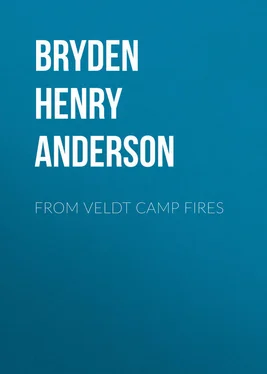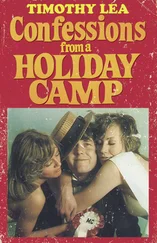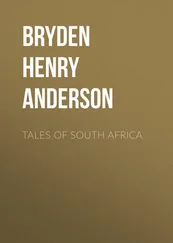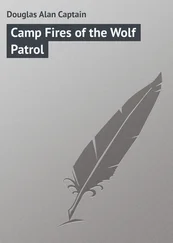Henry Bryden - From Veldt Camp Fires
Здесь есть возможность читать онлайн «Henry Bryden - From Veldt Camp Fires» — ознакомительный отрывок электронной книги совершенно бесплатно, а после прочтения отрывка купить полную версию. В некоторых случаях можно слушать аудио, скачать через торрент в формате fb2 и присутствует краткое содержание. Жанр: foreign_prose, foreign_antique, foreign_language, на английском языке. Описание произведения, (предисловие) а так же отзывы посетителей доступны на портале библиотеки ЛибКат.
- Название:From Veldt Camp Fires
- Автор:
- Жанр:
- Год:неизвестен
- ISBN:нет данных
- Рейтинг книги:3 / 5. Голосов: 1
-
Избранное:Добавить в избранное
- Отзывы:
-
Ваша оценка:
- 60
- 1
- 2
- 3
- 4
- 5
From Veldt Camp Fires: краткое содержание, описание и аннотация
Предлагаем к чтению аннотацию, описание, краткое содержание или предисловие (зависит от того, что написал сам автор книги «From Veldt Camp Fires»). Если вы не нашли необходимую информацию о книге — напишите в комментариях, мы постараемся отыскать её.
From Veldt Camp Fires — читать онлайн ознакомительный отрывок
Ниже представлен текст книги, разбитый по страницам. Система сохранения места последней прочитанной страницы, позволяет с удобством читать онлайн бесплатно книгу «From Veldt Camp Fires», без необходимости каждый раз заново искать на чём Вы остановились. Поставьте закладку, и сможете в любой момент перейти на страницу, на которой закончили чтение.
Интервал:
Закладка:
From Veldt Camp Fires
Chapter One.
A Secret of the Orange River
Many are the stories told at the outspan fires of the South African transport riders – some weird, some romantic, some of native wars, some of fierce encounters with the wild beasts of the land. Often have we stopped for a chat with the rugged transport riders, and some strange and interesting information is obtained in this way.
The transport rider – the carrier of Africa – with his stout waggon and span of oxen, travels, year after year, over the rough roads of Cape Colony and beyond, in all directions, and is constantly encountering all sorts and conditions of men – white, black and off-coloured; and in his wanderings, or over his evening camp fire, he picks up great store of legend and adventure from the passing hunters, explorers and traders.
One night, after a day’s journey through the bush-veldt, we lay at a farmhouse, near which was a public outspan. At this outspan two transport riders were sitting snugly over their evening meal; they seemed a couple of cheery, good fellows – one an English Afrikander, the other an Englishman, an old University man, and well-read, as we afterwards discovered – and nothing would suit them but that we should join them and take pot-luck. Attracted by their hospitable ways and the enticing smell of their game stow, for we were none of us anthobians, we sat us down and ate and drank with vigorous appetites. Their camp-pot contained the best part of a tender steinbok, and a brace or two of pheasants (francolins); and we heartily enjoyed the meal, washed down with the inevitable coffee.
Supper finished, some good old Cango (the best home-manufactured brandy of the Cape, made in the Oudtshoorn district) was produced, pipes were lighted, and then we began to “yarn.” For an hour or more we talked upon a variety of topics – old days in England, the voyage to the Cape, the Colony, its prospects and its sport.
From these, our conversation wandered up-country, and we soon found that our acquaintances were old interior traders, who in the days when ivory and feathers were more plentiful and more accessible than now, had over and over again made the journey to ’Mangwato and back. ’Mangwato, it may be explained, is the trader’s abbreviation for Bamangwato, Khama’s country, the most northerly of the Bechuana States; and of Bamangwato, Shoshong was formerly the capital and seat of trade. Then we wandered in our talk to the Kalahari, that mysterious and little known desert land, and from the Kalahari back to the Orange River again.
“’Tis strange,” said one of our number, “how little is known of the Orange River – at all events west of the falls; I don’t think I ever met a man who had been down it. One would think the colonists would know something of their northern boundary; as a matter of fact they don’t.”
“Ah! talking of the Orange River, reminds me,” said the younger of the transport riders, the ex-Oxonian, and the more loquacious of the two, “of a most extraordinary yarn I heard from a man I fell in with some years back, stranded in the ‘thirstland,’ north-west of Shoshong. Poor chap! he was in a sorry plight; he was an English gentleman, who for years had, from sheer love of sport and a wild life, been hunting big game in the interior. That season he had stayed too late on the Chobi River, near where it runs into the Zambesi, and with most of his people had got fever badly. They had had a disastrous trek out, losing most of their oxen and all their horses, and when I came across them they were stuck fast in the doorst-land (thirstland) unable to move forward or back. For two and a half days they had been without water, and from being in bad health to begin with, hadn’t half a chance; and, if I had not stumbled upon them, they must all have been dead within fifteen hours. I had luckily some water in my vatjes, and managed to pull them round, and that night, leaving their waggon in the desert in hopes of being saved subsequently, and taking as much of the ivory and valuables as we could manage and Mowbray’s (the Englishman’s) guns and ammunition, we made a good trek, and reached water on the afternoon of the next day. I never saw a man so grateful as Mowbray; I believe he would have done anything in the world for me after he had pulled round a bit. Poor chap! during the short time I knew him I found him one of the best fellows and most delightful companions I ever met. Unlike most hunters, he had read much and could talk well upon almost any subject, and his stories of life and adventure in the far interior interested and impressed me wonderfully. But the Zambesi fever had got too strong a hold upon him. I dosed him with quinine and pulled him together till we got to Shoshong, where I wanted him to rest, but he seemed restless and anxious to get out into the open veldt again, and after a few days we started away. Before we had got half-way down to Griqualand, Mowbray grew suddenly worse and died one evening in my waggon just at sunset. We buried him under a kameel doom tree, covering the grave with heavy stones, and fencing it strongly with thorns to keep away the jackals and hyenas.
“Many and many a talk I had with poor Mowbray before he died; sometimes he would brighten up wonderfully and insist on talking to me for hours, as he lay well wrapped up, in the evening, underneath my waggon sail. One evening, in particular, he had seemed so much stronger and better, and, later on, as we sat before the camp fire on the dewless ground, where I had propped him up and made him comfortable, he told me a most strange story, a story so wonderful that most people would scout and laugh at it as wildly improbable; yet, remembering well the narrator and the circumstances under which he told it to me, with the shadow of death creeping over the short remaining vista of his life, I believe most firmly his story to be true as gospel.
“Poor chap! He began in this way: ‘Felton, you have been a thundering kind friend to me, kind and tender as any woman (which, by the way, was all nonsense), and I feel I owe you more than I am ever likely to repay; yet, if you want wealth, I believe I can put it in your way. Do you know the northern bank of the Orange River, between the great falls and the sea? No! I don’t suppose you do, for very few people have ever trekked down it; still fewer have ever got down to the water from the great walls of desolate and precipitous mountain that environ its course, and, except myself and two others, neither of whom can ever reveal its whereabouts, I believe no mortal soul upon this earth has ever set eyes upon the place I am going to tell you about. Listen!
“In 1871, about the time the diamond fields were discovered, and people began to flock to Griqualand West, I was rather bitten with the mania, and for some months worked like a nigger on the fields; during that time I got to know a good deal about stones. I soon tired of the life, however, and finally sold my claim and what diamonds I had acquired, fitted up a waggon, gathered together some native servants, and trekked again for those glorious hunting grounds of the interior, glad enough to resume my old and ever-charming life. Amongst my servants was a little Bushman, Klaas by name, whom I afterwards found a perfect treasure at spooring and hunting. Like all true Bushmen, he was dauntless as a wounded lion, and determined as a rhinoceros, which is saying a good deal. I suppose Klaas had had more varied experience of South African life than any native I ever met. Originally, he had come as a child from the borders of the Orange River, where he had been taken prisoner in a Boer foray, in which nearly all his relations were shot down. He had then been ‘apprenticed’ in the family of one of his captors, where he had acquired a certain knowledge of semi-civilised life. From the Boer family of the back-country, he had subsequently drifted farther down into the colony, and thence into an elephant hunter’s retinue. He had accompanied expeditions with Griquas, Dutch and Englishmen all over the far interior. The Kalahari desert, Ovampo-land, Lake Ngami, the Mababi veldt, and the Zambesi country, were all well known to him, for in all of them he had traded, hunted and, on occasion, fought. As for the Western Orange River and its mysteries – for it is a mysterious region – he knew it, as I afterwards discovered, better than any man in the world. Well, we trekked up to Matabeleland and, after some trouble, got permission to hunt there; and a fine time we had, getting a quantity of ivory, and magnificent sport among lions, elephants, buffaloes, rhinoceros, sable and roan antelopes, koodoo, eland, Burchell’s zebras, pallah and all manner of smaller game.
Читать дальшеИнтервал:
Закладка:
Похожие книги на «From Veldt Camp Fires»
Представляем Вашему вниманию похожие книги на «From Veldt Camp Fires» списком для выбора. Мы отобрали схожую по названию и смыслу литературу в надежде предоставить читателям больше вариантов отыскать новые, интересные, ещё непрочитанные произведения.
Обсуждение, отзывы о книге «From Veldt Camp Fires» и просто собственные мнения читателей. Оставьте ваши комментарии, напишите, что Вы думаете о произведении, его смысле или главных героях. Укажите что конкретно понравилось, а что нет, и почему Вы так считаете.












